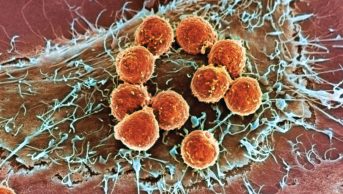
Shutterstock
Several markers have been identified that can predict response to the immunotherapy pembrolizumab in specific tumour types. But a universal marker across all tumour types has not been established.
In research published in Science
[1]
(8 June 2017), a team enrolled 86 patients with 12 different cancer types whose disease had progressed despite previous treatment to receive pembrolizumab for up to two years. All the patients had mismatch-repair (MMR) deficiencies, meaning they had mutations in genes involved in repairing DNA errors.
The team found that 66 (77%) of the 86 patients (95% confidence interval, 66–85%) achieved disease control for at least 12 weeks, including 18 (21%) patients who had a complete response.
Given that tests for MMR-deficiency are already available, the researchers predict that in future it will become standard to test for MMR deficiency in patients with refractory cancer, regardless of tumour type.
References
[1] Le D, Durham J, Smith K et al. Mismatch-repair deficiency predicts response of solid tumors to PD-1 blockade. Science 2017. doi: 10.1126/science.aan6733


